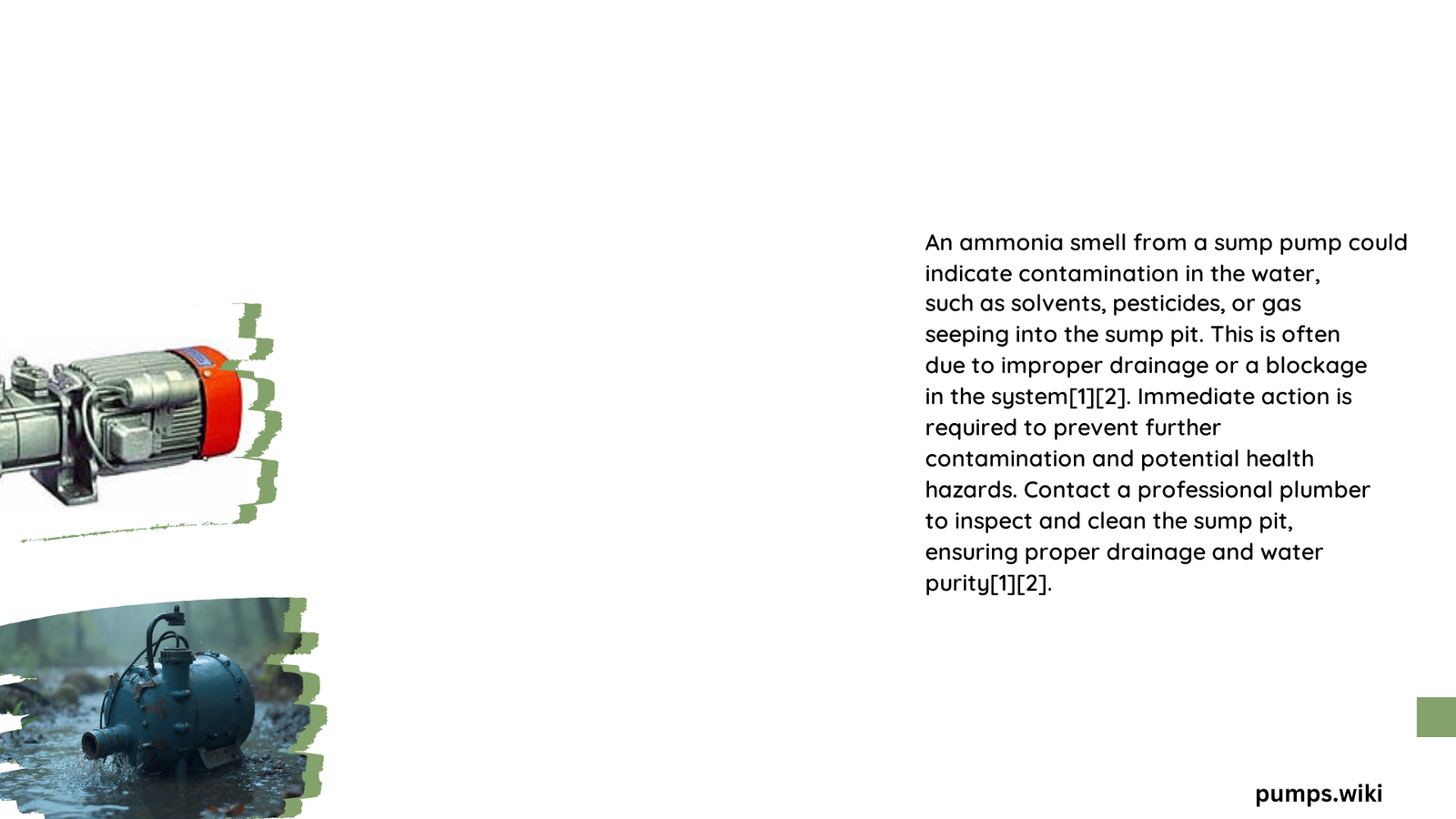An ammonia smell from a sump pump can indicate various issues, including sewage infiltration, stagnant water, or bacterial growth. This odor not only creates an unpleasant environment but can also signal potential health risks and pump inefficiencies. Understanding the causes, implementing effective solutions, and maintaining proper preventive measures are crucial for addressing this common household problem.
What Causes Ammonia Smell in Sump Pumps?
The presence of an ammonia odor in your sump pump can be attributed to several factors:
- Sewage Infiltration: Leaks or ruptures in sewer lines can contaminate groundwater, leading to foul odors.
- Stagnant Water: Incomplete drainage allows water to sit, creating an ideal environment for odor-producing bacteria.
- Dry Sump Basin: During dry periods, ammonia-like gases can escape from the soil in an empty basin.
- Blockages: Obstructions in pipes or the pump itself can prevent proper drainage, causing water to stagnate.
How Can You Remove Ammonia Smell from Sump Pumps?

Addressing the ammonia smell requires a combination of cleaning and maintenance:
- Bleach Solution Treatment:
- Mix 1 cup of bleach with 1 gallon of fresh water
- Pour the solution into the sump basin
-
Use a scrub brush to clean the basin walls
-
Ensure Proper Drainage:
- Check and adjust the float switch
-
Verify the check valve’s functionality
-
Clean the Sump Pit:
- Remove debris and sediment regularly
- Consider professional cleaning for thorough maintenance
What Maintenance Practices Prevent Ammonia Smell?
Implementing these preventive measures can help avoid future odor issues:
- Regular Inspection:
- Check the pump system components periodically
-
Look for signs of wear or malfunction
-
Cleaning Schedule:
- Set up a routine cleaning plan
-
Clean every few months or as needed based on usage
-
Water Level Maintenance:
- Keep a small amount of water in the basin
-
Prevents drying out and maintains pump lubrication
-
Proper Ventilation:
- Improve airflow around the sump pump area
- Consider installing ventilation systems if necessary
How Does Ammonia Smell Impact Sump Pump Performance?
The effects of persistent ammonia odor can be significant:
| Impact | Description |
|---|---|
| Reduced Efficiency | Bacterial growth and stagnant water can clog the system |
| Increased Costs | Neglecting the issue leads to more frequent repairs or replacements |
| Health Risks | Ammonia odors may indicate the presence of harmful bacteria and gases |
What Are the Long-Term Consequences of Ignoring Ammonia Smell?
Failing to address the ammonia smell can lead to:
- Structural Damage: Prolonged exposure to moisture and bacteria can weaken building materials.
- Decreased Property Value: Persistent odors can make a home less appealing to potential buyers.
- Health Issues: Long-term exposure to ammonia and related gases can cause respiratory problems.
How Can You Diagnose the Source of Ammonia Smell?
To pinpoint the exact cause of the odor:
- Visual Inspection:
- Check for visible signs of water stagnation or debris accumulation
-
Look for cracks or damage in the sump pit or surrounding area
-
Water Testing:
- Collect a sample of the water in the sump pit
-
Have it tested for contaminants and bacteria levels
-
Professional Assessment:
- Consider hiring a plumber or sump pump specialist
- They can perform a comprehensive evaluation of your system
What Are Some DIY Solutions for Minor Ammonia Smell Issues?
For less severe cases, try these home remedies:
- Vinegar Rinse:
- Pour a mixture of equal parts water and white vinegar into the sump pit
-
Let it sit for an hour before pumping it out
-
Baking Soda Treatment:
- Sprinkle baking soda around the edges of the sump pit
-
This can help absorb odors and neutralize acidic compounds
-
Enzyme Cleaners:
- Use enzyme-based cleaners designed for septic systems
- These can break down organic matter causing odors
When Should You Call a Professional for Ammonia Smell in Sump Pump?
Seek professional help if:
- The odor persists after DIY treatments
- You notice a sudden increase in water volume or frequency of pump activation
- There are visible signs of sewage contamination
- The pump shows signs of malfunction or reduced efficiency
How Can You Prevent Future Ammonia Smell Issues?
Implement these long-term strategies:
- Regular Maintenance Schedule:
- Set reminders for routine checks and cleaning
-
Keep a log of maintenance activities
-
Upgrade Your Sump Pump System:
- Consider installing a more efficient pump
-
Add a battery backup to prevent stagnation during power outages
-
Improve Drainage Around Your Home:
- Ensure proper grading away from the foundation
-
Maintain gutters and downspouts to direct water away from the house
-
Install a Sump Pump Alarm:
- Early warning system for high water levels or pump failures
- Helps prevent water stagnation before odors develop
By understanding the causes of ammonia smell in sump pumps and implementing these solutions and preventive measures, homeowners can maintain a clean, odor-free basement environment. Regular attention to your sump pump system not only eliminates unpleasant smells but also ensures the longevity and efficiency of this crucial home maintenance component.
References:
1. https://www.rootermantx.com/blog/reasons-why-your-sump-pump-may-smell/
2. https://apollohome.com/blog/sump-pump-odors-as-red-flags-what-those-smells-are-trying-to-tell-you/
3. https://www.plumbingforums.com/threads/strong-ammonia-smell-shower-drain.16755/
